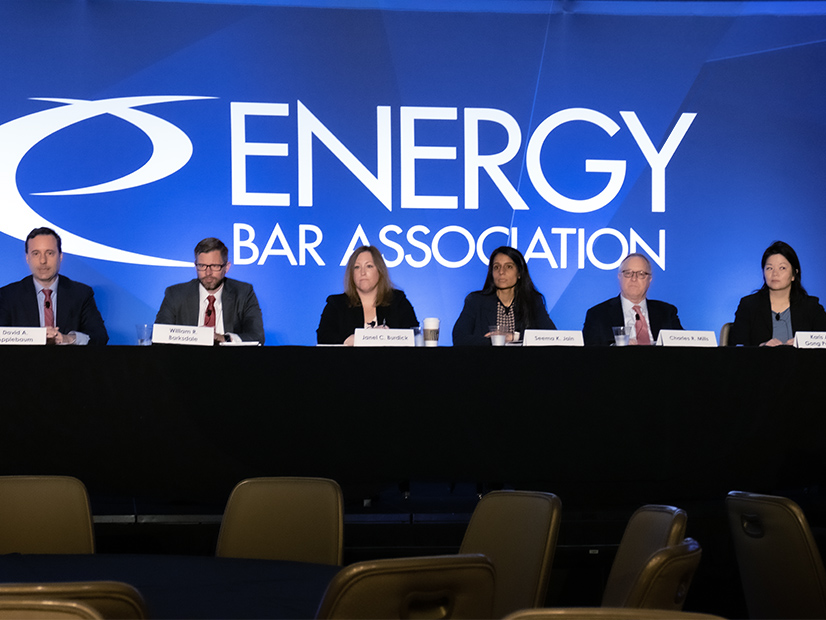
WASHINGTON — FERC’s enforcement powers have been impacted by some recent court cases, and the commission itself has some new priorities, experts said at a panel Friday during the Energy Bar Association’s Annual Meeting.
The commission for a long time had four main priorities when it comes to enforcement: market manipulation; serious violations of reliability standards; threats to transparency; and anticompetitive conduct, said Jones Day partner David Applebaum, a six-year FERC veteran and former director of the Division of Investigations. But in late 2021, it added a fifth: threats to the nation’s infrastructure and associated impacts on the environment and neighboring communities.
“I wouldn’t categorize the addition as any indication that we were investigating or penalizing conduct that had previously gone unaddressed, but rather as an indication that we had seen a compliance concern in this area,” FERC Office of Enforcement Director Janel Burdick said. “And specifically, I’m talking about violations of hydroelectric licenses, as well as certificate orders associated with [Natural Gas Act] Sections 3 and 7.”
While so far the new policy only applies to dams and natural gas infrastructure — with FERC getting some expanded authority over electric transmission in National Interest Electric Transmission Corridors — the commission could start to pursue similar cases in the power industry. Burdick, however, said those issues are still being hammered out by the commission, so it is unclear how this would play out.
One example of its new focus was a $700,000 settlement FERC approved with the natural gas storage facility outside Houston called Tres Palacios because it failed to conduct sonar surveys of its salt caverns as required in its certificate, said Bracewell partner Charles Mills. The firm admitted that it had not done the survey and even asked for an extension, which was denied (IN21-3).
“The things that can somewhat be taken away from it are: There was no finding of negligence, no finding harm, in order to find a violation,” Mills said. “It appears to be somewhat strict liability; if that certificate says you must do something, then you’ve got to do it.”
The Tres Palacios case was straightforward, but other cases involving the new priority could involve more litigation, such as when FERC pursues enforcement against a pipeline for its post-construction cleanup activities, in which whether that work was done properly can be a matter for debate, Mills said.
FERC has long pursued market manipulation cases, and some of those have worked their way through the courts after years of litigation and have set some precedent.
The commission alleged that BP manipulated natural gas prices in the Houston Ship Channel following Hurricane Ike in 2008 to benefit its positions elsewhere. In a decision last October, the 5th U.S. Circuit Court of Appeals agreed with BP on jurisdiction, said William Barksdale, energy regulatory counsel with Skadden, Arps, Slate, Meagher & Flom.
Most of the transactions in question were intrastate, and while FERC claimed authority because they impacted markets it regulates, the court disagreed and threw those out. The court told the commission to recalculate the fine based on the much smaller group of transactions it did have jurisdiction over, Barksdale said.
Another case where FERC managed to dodge having precedent set against some of its powers of disgorgement came in litigation with Coaltrain Energy, which is one of the firms that allegedly manipulated PJM’s market in the summer of 2010, said Mills. It and other firms used otherwise unprofitable up-to-congestion transactions to maximize marginal loss surplus allocation (MLSA) payments.
Coaltrain argued that FERC did not have the authority to order disgorgements, and the court agreed with the firm. The case was getting ready to go to trial, but FERC settled with Coaltrain for the $4 million in disgorgement alone, dropping significantly higher civil penalties it had initially sought, and got the court to vacate its opinion.
“So that’s over $50 million in fines [removed] from the case, but disgorgement is preserved,” said Mills. “To me, this indicates the importance that FERC places on disgorgement as a remedy but also [the] concern that its jurisdiction is being challenged, and they’re losing that jurisdictional point, and they don’t want that.”
Another one of the firms that allegedly engaged in the UTC-for-MLSA scheme back in 2010, Powhatan Energy Fund, recently wrapped up the litigation in a default judgment after it declared bankruptcy. That decision issued in March was important because it shows the commission has been winning on jurisdictional arguments, said Seema Jain, branch chief of Enforcement’s Division of Investigations.
“This is an important decision, because it’s the only final judgment on an enforcement case under the Federal Power Act,” said Jain. “So, you know, I want to highlight that. And the court granted FERC’s motion for default judgment against Powhatan and ordered disgorgement of $3.4 million, as well as $16.8 million in civil penalties. As part of that order, the court found that the commission’s well pleaded complaint and penalty order established that Powhatan committed market manipulation.”



